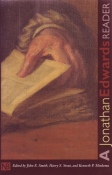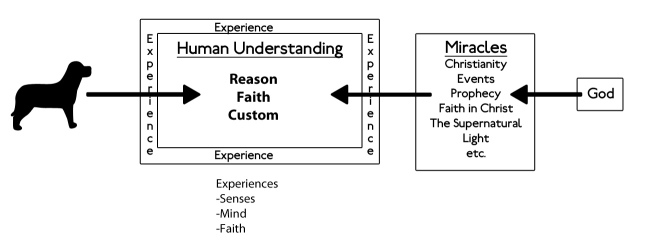*This post was written after the project was complete
 How do we experience God? How is he made known to us?
How do we experience God? How is he made known to us?
Jonathan Edwards wrestles through these questions in A Divine and Supernatural Light. Edwards believes that man has experiences the light though his own faculties (reason, natural conscious, etc.), but that it is immediately imparted to the soul by God. It’s by these faculties that we experience God. But what are these faculties? How do they come about?
Three Tiered Grace
Edwards presents a three tiered system of grace in regards to the faculties of man. The natural man has his faculties such as conscious and reason, but their are things, such as sin, that tend to stupefy and obstruct their exercise. The man with common grace is given occasional support from God to correct these faculties, but does not enjoy a permanent in dwelling. Finally, the one with special grace is the one with a permanent indwelling and in whom God removes the things that stupefy and obstruct the exercise of such faculties as reason and conscious. Edwards preached:
Not only are remaining principles assisted to do their work more freely and fully, but those principles are restored that were utterly destroyed by the fall; and the mind thenceforward habitually exerts those acts that the coming of sin had made wholly destitute of, as a dead body is of vital acts.
–“A Divine and Supernatural Light“, A Jonathan Edwards Reader, 108
Restored Faculties
Not only are the natural faculties enabled to work more fully, but ones that were destroyed are restored as well. The question is, what are these faculties that were restored? Well, if you take a trip over the pond (and 40 so years into the future), Scottish philosopher David Hume will give the answers.
Hume argues that one of these newly established faculties is the faculty of faith.For Hume, human understanding falls into three categories: reason, faith, and custom. Reason is man’s ability to think and reason. Faith is made up of the things above reason. Custom is that which “covers our natural ignorance” and allows man to understand cause and effect. For example, man does not see the cause of the movement of a billiard ball when it is hit by another, but custom allows him to not experience the cause but infer it by seeing that it happens.
However, these faculties of the understanding must have a subject to understand. These subjects are brought in by the faculties of experience. The two natural faculties are senses and the mind. The senses allow us to see, hear, feel, small, and taste thing, such as the dog on the lest. By experience him with our senses, we are able to understand them to an extent. The faculty of the mind experiences ideas formed in the head, like math, inner monologues, etc.
Faith, however, is the new faculty. Objects of faith are those that go against experience and custom. To believe them is to go against the rational part of the mind. One cannot experience a miracle merely by the senses, but must have faith. This faith becomes a miracle in itself. Hume says it much better than myself:
Mere reason is insufficient to convince us of its veracity: And whoever is moved by Faith to assent to it, is conscious of a continued miracle in his own person, which subverts all the principles of his understanding, and gives him a determination to believe what is most contrary to custom and experience
–An Enquiry Concerning Human Understanding, p. 90
This faith allows human understanding to experience God. It is the faculty that lets him into the inner workings of the mind. And this faith is given by the Holy Spirit (73), as Edwards would claim.
The Use of the Holy Spirit and the Supernatural Light
Edwards treats the Holy Spirit as a being that, among other things, improves the man. While naturally man is disconnected from the spiritual life, the Holy Spirit begins to realign him. It affects the Christian in every way of life, improving everything he does. This is similar to John Newman’s view of the University. Though he does not make a claim that the University is similar to the Holy Spirit or its replacement, he does explain it as an overall influence upon ever part of life.
I say that a cultivated intellect, because it is good in itself, brings with it a power and a grace to every work and occupation which it undertakes, and enables us to be more useful, and to a greater number
–The Idea of a University, p. 119
The liberal arts education is an influencing force that helps man reason and learn how to learn. He is more equipped not for a specific job, but for any job as he (or she) has been supplied with a wide skill set. The Holy Spirit similarly enables the Christian to perform not one but several Christian virtues and to apply his spiritual learning to all parts of his life.
As Edwards claimed, we have restored faculties, thanks to salvation. These faculties, including faith, let in the Super Natural Light and the Holy Spirit to work in all areas of our lives. The Christian should not compartmentalize nor minimize the work of the Spirit. Rather, the Christian should seek out the Spirit in all he does as the Spirit will enable him in all things.


